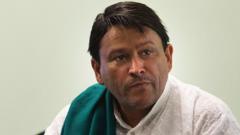The killing of Muhsin Hendricks, the first openly gay imam, ignites calls for justice in South Africa as authorities pursue suspects linked to the crime, which raises questions about hate-motivated violence against the LGBTQ+ community.
South African Authorities Intensify Hunt for Suspects in Openly Gay Imam's Murder

South African Authorities Intensify Hunt for Suspects in Openly Gay Imam's Murder
Police action escalates following the fatal shooting of Muhsin Hendricks, a pioneer for LGBTQ+ rights within the Muslim community.
South African police are actively pursuing suspects involved in the murder of Muhsin Hendricks, recognized as the world's first openly gay imam, as confirmed by Deputy Justice Minister Andries Nel. The 57-year-old Hendricks was shot dead in broad daylight while in his car in Gqeberha on Saturday, causing shockwaves throughout the LGBTQ+ community and beyond.
Reportedly, CCTV footage captured a hooded individual emerging from a pickup truck that had blocked Hendricks’ vehicle before firing into the window. An investigation has been initiated, but Nel indicated it remains unclear if the incident constitutes a hate crime. He assured that Deputy Police Minister Polly Boshielo had informed him that authorities are diligently tracking down the suspected assailants.
Hendricks, who came out as gay in 1996, was a prominent advocate for marginalized Muslims, continually challenging traditional beliefs surrounding Islam and sexuality. His murder prompted Nel to praise Hendricks as a figure of pride for South Africans, emphasizing his commitment to diversity and inclusivity.
In a show of solidarity, South Africa's Muslim Judicial Council (MJC) condemned the killing, despite not aligning with Hendricks' viewpoints, declaring the need for peaceful coexistence among differing beliefs. Conversely, the United Ulama Council of South Africa criticized "extrajudicial killings" and cautioned against premature conclusions regarding motives.
South Africa's constitution, established following the end of apartheid in 1994, was groundbreaking in protecting individuals against discrimination based on sexual orientation, with the country becoming the first in Africa to legalize same-sex marriage in 2006. However, gay individuals continue to confront violence and discrimination in a nation with one of the highest murder rates globally.
Hendricks’ legacy includes founding The Inner Circle, a support network for queer Muslims navigating their faith and sexuality, and establishing the inclusive Masjidul Ghurbaah mosque. In 2022, he was featured in a documentary titled The Radical, where he indicated that “the need to be authentic was greater than the fear to die." Additionally, he advocated for interfaith dialogue and addressing the mental health challenges faced by LGBTQ+ individuals within religious settings.
Continuing to resonate, Hendricks' message stresses the importance of viewing religion as a source of understanding rather than opposition for the LGBTQ+ community. As South Africa grapples with this tragic loss, calls for justice and reflection on the broader societal challenges regarding LGBTQ+ rights persist.



















